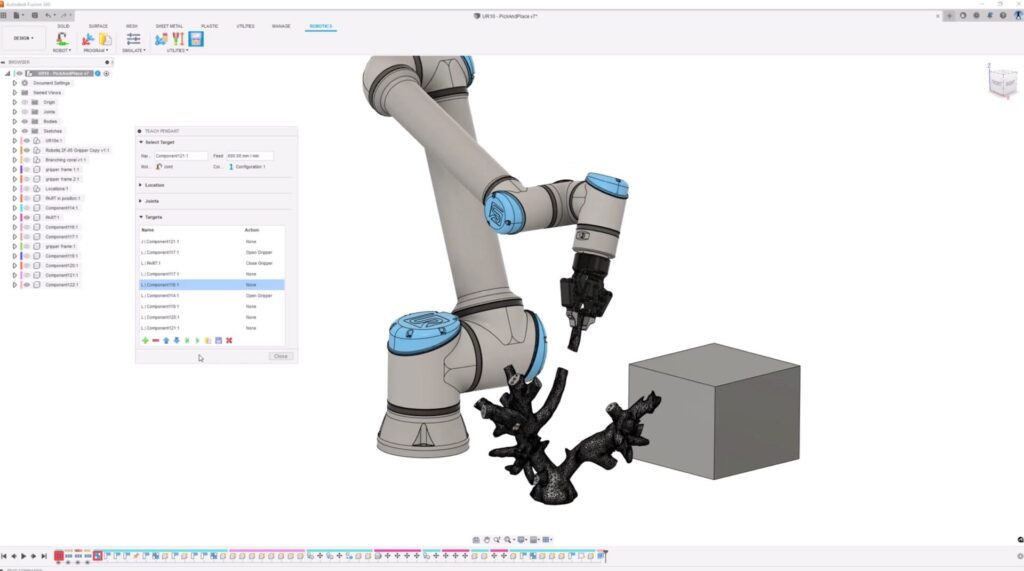This post is also available in: Français (French) Italiano (Italian) Deutsch (German) 日本語 (Japanese)
Due to climate change, many of the Earth’s coral reefs are being affected by coral bleaching. Coral Maker is tackling this problem head-on, planning to plant millions of corals a year with the help of Fusion 360.
When many people hear “coral reef,” they picture a rainbow array of creatures coexisting on the ocean floor, snorkeling on vacation, and perhaps even the ever-optimistic Finding Nemo. However, the stark reality is that because of climate change, many of the Earth’s reefs are starting to look more like uninhabited ghost towns due to a process called coral bleaching. Coral bleaching occurs when warming ocean temperatures affect the coral’s biology, causing them to go into a high state of stress, turn white, and often dying altogether.
Sure, this monochrome display has its own unique, spooky beauty to it, but it certainly isn’t healthy for our planet. “Coral reefs are incredibly biodiverse and important ecologically,” explains Dr. Taryn Foster, founder, Coral Maker. “Their structure also protects our coastlines, providing a barrier to storms and coastal erosion.”
Coral Maker is an Australian company that is taking a new, accelerated approach to restoring coral reefs. Foster, a coral biologist, and avid diver, began to think about how she could use her research background to actively restore reefs when she started to connect the dots between her scientific experience and her family business. Her family works in the masonry manufacturing industry, and they own machinery that makes limestone blocks and other products for the construction industry. Then came the lightbulb moment: what if these machines could be used to rapidly make skeletons for corals?

The typical coral restoration process involves cutting a little piece of live coral from an existing colony, then allowing that piece to grow its own skeleton and eventually grow into a bigger colony. The issue with this process is time. Coral naturally grows very slowly (think 3-10 years before a piece grows its own adult-sized skeleton). To speed up the process, Coral Maker provides these tiny coral pieces with premade skeletons.
To make a real impact, you need to plant millions of corals each year. And that’s exactly what Coral Maker plans to do.
Pursuing a solution to propel coral growth
Coral Maker’s origins began several years ago. Through a Fulbright Fellowship at the California Academy of Sciences, Foster moved to San Francisco in 2019. She then applied to Autodesk Research’s Outsight Network, a global residency program at the Autodesk Technology Center in San Francisco, in hopes that she could develop her concept further. Once accepted, Foster hit the ground running Through the Autodesk Foundation’s pro bono program, she started working with a team of Autodesk employees from various backgrounds, including robotics, manufacturing, engineering, and marketing. Foster and the team also had access to Autodesk software through Autodesk’s Technology Impact Program.

Foster relocated back to Australia during the pandemic. The team continued to work remotely, designing and prototyping molds in Fusion 360 for mass manufacturing coral skeletons, as well as testing robotics systems for coral seeding. The molds could also be tested in her family’s facility in a factory setting. Foster was also able to test different versions of the prototypes with live corals in the ocean, at the Abrolhos Islands, off the coast of Geraldton in Western Australia.
“Collaboration in Fusion 360 is key for our work with Coral Maker. I’m here in Birmingham, UK, there’s the San Francisco team and Taryn in Western Australia. Any of us can update the model in our respective time zones, and any changes are immediately available to view halfway around the world.”
– Tom Hemans, Manufacturing Specialist, Autodesk
Additive manufacturing also aids in the evolution of the skeleton designs as they approach the final design. Foster needs to test the prototypes to ensure they’re the right shape and that they can be easily handled in the water on scuba.
“Taryn can 3D print a part from the Fusion 360 model,” says Tom Hemans, manufacturing specialist, Autodesk. “With a physical copy, she can give us additional feedback such as a better place to grip. We can then use this information to continue iterating.”
Additionally, the team has used CNC machines to produce mold tools from metal that they’ll eventually use to mass-produce the coral skeletons.
Moving Forward to Save Coral Reefs
Manufacturing the skeletons using a recycled stone composite has the potential to scale to 10,000 skeletons per day and each with the capacity to hold 6-8 coral fragments. However, there is the delicate seeding of those fragments, and robotics is a crucial component of that process. Finding the perfect gripper to pick up the coral without damaging it is hard to come by. With Fusion 360 and its electronics design capabilities, they are experimenting to find new solutions.

“There is a pneumatic gripper that we may use, but it doesn’t have quite the radius we need,” says Nic Carey, senior principal research scientist and engineer, Autodesk. “We’re using Fusion 360 to add soft extensions with silicon to the gripper that can also be easily mass-manufactured.”
Coral Maker is currently fundraising for a seed round to complete R&D and bring the solutions to market. The next steps will include testing the robotics system in the field and conducting larger-scale ocean-based coral trials. This will be followed by a large-scale pilot project to test the process (from start to finish) operationally.
“Relocating corals or assisted migration is something that I’m really passionate about, and this is where I think that Coral Maker can have a lot of impact,” Foster says. “I want to see change, and I want to see our coral reef ecosystems get all the possible interventions they’re going to need to save them.”
Ready to start making an impact? Get started with a free 30-day trial of Autodesk Fusion 360.